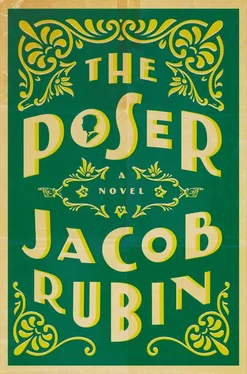• • •
I could hear people talking to me. I observed the doctor’s armchair abiding my weight. The water of the pool cinching around my waist. Every morning, Mama’s voice like a radio in my ear.
• • •
Spring dulled into summer. Time was passing, I was aware of that, but only distantly, in the way one is aware of a holiday celebrated by foreigners. Time no longer pertained to me. I learned that in the basement. A relapse, as it’s called by doctors, teaches you this: The condition is more a part of you than the solution will ever be. “You are not me, you never have been and never will,” I said to the birds on the lawn.
• • •
From the dreams of that period: I am onstage at the Communiqué. The crowd wolf-whistles, demands an encore. Max, looking as he did the day he visited me at No More Walls, beckons for the next volunteer. “Who will have the gall, the guts, the gumption, to join Giovanni on this grandest stage?” Max shields his eyes to see more clearly the hand in the back. “You, sir. Please come.” A hush. The figure ranges in the darkness. He can be heard excusing himself around the tables, takes his first lean steps onto the stage. He is tall and lanky, the volunteer. He is dressed in a tuxedo. The crowd, I see now, is all skeletons, white and shiny, jaws clacking with laughter.
• • •
A feeling started inside me: a gut-punching envy. Acute as thirst. I envied the heel of the janitor’s hand sweeping crumbs from a table, the liver-spotted cheek of a patient. I walked around with tears in my eyes.
One western in particular I watched over and over in the screening room, envying to death the puggish sidekick. The sidekick leaned over the horse to spit. He wiped his mouth angrily with the back of his hand. I wept at the perfection of that sidekick. In no time the film would end, the fluorescent lights would tick on, and the darkened windows would throw out cruel reflections: of me looking bearded, lavishly medicated. All that awaited me was the night and my room, where I hated going, where I was terrified of going, where I was sure — every night, sure —that I would vanish. “Your toes do not inhabit your cotton socks as mine do, your thoughts do not move and agitate in the skull as mine do,” I muttered in no one’s voice.
• • •
All I asked from life was to observe it.
It started with one of the custodians, a freckled woman, big-boned. During Free Hours I began to shadow her along the circuit she made to empty the property’s garbage cans. Before each wastebasket she’d gird herself like a weightlifter. Then with tensed arms she’d raise the packed can and upend it with a grimace, its contents tumbling, with a clotted rhythm, into a larger bag she’d placed nearby. Setting the can back down, she’d reach into it one last time, stretching for whatever bits of trash remained, her face producing a wonderful, effortful grin.
After the custodian, I followed a sunken-eyed nurse, a security guard. I learned to hide behind bookshelves, to look away at the right moment. These bodies offered a therapy far greater than that of Dr. Orphels, across from whom I sat every day without saying a word. They were my body, these people.
• • •
I first noticed her because of the camera. It looked expensive, hanging from a leather strap around her neck. She was always picking it up to take photos, usually of standard objects, like trees and doorknobs, ten or fifteen at a time.
Within the rigidity of the No More Walls schedule, she limited her range even more, sticking to a routine inside the routine. At breakfast she sat alone at a table by the window, consuming a half grapefruit and two hardboiled eggs with the wide-eyed avidity of a child. In the eight a.m. exercise class on the south lawn, she stood without fail in the farthest right row, second to the front, where she jogged in place and stretched with what was either a nervous or very earnest energy. Water Therapy followed where I was treated to a vision of her petite and queenly figure outside the vagueness of her scrubs. She wore the hospital-issued blue one-piece all the women did, and her dish-white legs flashed along the wet blue tiles, her bottom jutting and swinging like some oblivious tail. She had very correct posture, fiddled religiously with her ponytail: stroking it ten times with the right hand, ten with the left. These numbers were precise and repeated, just as she cleaned her fork nine times and walked around the lawn before dinner twice, all the while snapping photos of an oak tree, a wooden bench, a dinner knife. Each day she marched over to the rightmost Jacuzzi, tested its waters with her toe three times — always three — then three times up to her knee, before finally sinking in. When she did finally soak, she made a loud expression, as if she’d swallowed hot food.
She could not have been counted among the more social patients, those who chatted in the back of art class or gossiped in the mess hall. Not once had I seen her talk, yet a warmth radiated from her, an availability, despite the cocoon she, like so many of us, wriggled within. Her method of notifying another of her presence — of alerting them, say, that she stood behind them in the hall — was to cup that person’s shoulder gently. All in all, she carried herself with the overstatement of a silent-movie actor, frowning, shrugging, darting, her camera always clipping , loud as scissors. Behind it, her forehead tense with focus.
During Free Hours she retreated to the small, gummy pond behind the orchard. She liked to sit under the weeping willow. Tree frogs belched and dragonflies, like tiny helicopters, buzzed over the water, but this woman, sealed within herself, didn’t seem to notice. Often she chucked pebbles into the pond or ripped out blades of grass. Sometimes she cracked her joints or formed bats with her hands and flew them around. I’m ashamed to say that I, lying on top of the embankment like a scout with a spyglass — I witnessed her do this four or five times before I realized that she was talking to herself. It was sign language.
• • •
The next afternoon I discovered the note under my door. A folded piece of paper inscribed with the words For You . I recoiled from it as from a rat. The letters were so exact it looked like they had been written with a stencil. I turned on the bedside lamp and opened it.
You, Stop following me. I mean this seriously, STOP. Amelia Stern, Door 12.
I read the note until it trembled in my hands. A thousand oaths I swore to myself: to knock on her door right then, to hide forever from everyone, and soon I was blathering to the man I trusted least in the world because I had to talk and Doctor Orphels, he was there. My session took place an hour after my discovery of the note, and there I spewed in breathless monologue what little I knew about this Amelia Stern. It was the first time I had spoken to the doctor in months, the first time in months I’d spoken at all (outside of muttering his speech to me), and I was expecting, I think, some theatrical rapprochement — a welcome-back sort of speech, a wry grin, at the very least, but Orphels simply listened, reading her note when I handed it to him. “I know,” he said. “I told her to write it.”
“Told her?!”
“She’s my patient. She noticed your following her and found it discomfiting. I told her she ought to notify you of this feeling. As you rightly observed, she’s deaf, so a written note seemed best.”
“You knew about this? All this time, you knew ? Did you, did you orchestrate this?”
“But how could I have?” He smiled. “You were the one following her.”
“You’re just like Bernard. You use a person.”
“I believe you were the one who had been using me, Giovanni, using my voice, my history. I thought we discussed that.”
Читать дальше












